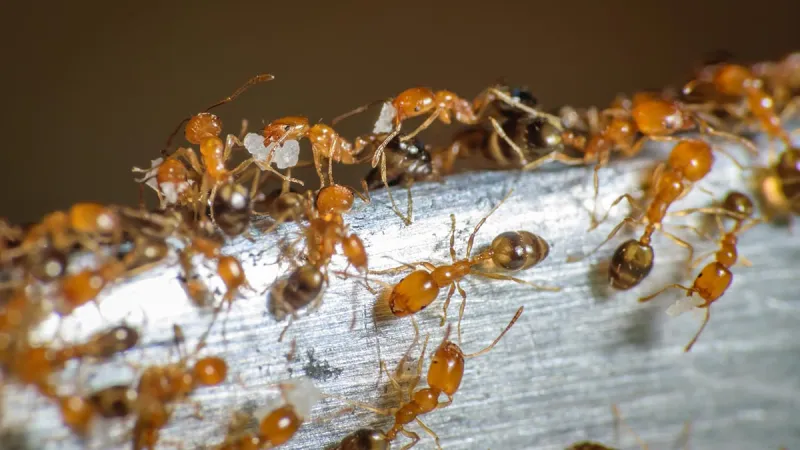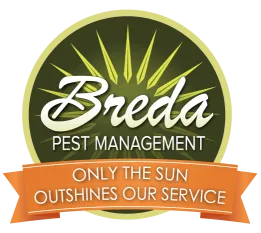
Pharaoh Ants Information

Pharaoh Ants
Very small, light-yellow to red in color (almost translucent) with black markings on the abdomen. Sometimes referred to as sugar ants. Feed mainly on sweets, greasy and fatty foods. Colony size can vary from a single queen with a few hundred workers to large colonies containing multiple queens and thousands of workers. Do have stingers but do not sting humans. Keep surfaces dry and clean of sugary foods; fats and grease remains should be kept wiped clean.
More about Pharaoh Ants
The pharaoh ant, scientifically known as Monomorium pharaonis, is a tiny but persistent pest that is known for its ability to infest various environments, including homes, businesses, and healthcare facilities. These ants are notorious for their small size, adaptability, and persistent nature, which makes them challenging to control. BREDA Pest Management delves into the world of pharaoh ants, exploring their characteristics, behavior, impact on the environment, and effective strategies for their control.
Pharaoh ants are small ants, typically measuring between 1.5 to 2 mm in length. They are light yellow to light brown in color, with dark-colored heads and bodies. They have long antennae and a characteristic two-segmented petiole, which gives them their distinctive appearance. Pharaoh ant colonies are typically composed of multiple queens and can contain thousands of workers, making them difficult to eliminate.
One of the most concerning aspects of pharaoh ants is their ability to infest a wide range of environments. They are commonly found in homes, particularly in kitchens and bathrooms, as they are attracted to food and water sources. They are also known to infest hospitals, nursing homes, and other healthcare facilities, where they can contaminate sterile areas and pose a risk to patients with weakened immune systems. Additionally, pharaoh ants can infest commercial and industrial buildings, such as restaurants, food processing facilities, and hotels, where they can cause economic losses and damage reputation.
Pharaoh ants have a unique behavior that makes them particularly challenging to control. They are known for their ability to establish multiple nests and create intricate trails to forage for food. They can exploit a wide range of food sources, including sweets, proteins, and greasy foods, making them difficult to eliminate through simple baiting techniques. They are also known to quickly adapt to changes in their environment, making them resilient to traditional pest control methods.
Effective control of pharaoh ants requires an integrated pest management approach that combines multiple strategies. At BREDA Pest Management, we start with sanitation. Sanitation is a key component, as eliminating food and water sources can reduce ant populations and discourage their activity. Identifying and eliminating ant nests, including satellite nests, is also crucial to achieving long-term control. Baiting with ant-specific baits that contain slow-acting insecticides can be effective, as the ants carry the bait back to the nest, resulting in colony elimination. However, bait rotation may be necessary to overcome their bait aversion and prevent bait resistance. Professional pest management services may be required for severe infestations or sensitive environments, such as healthcare facilities.
Prevention is also a crucial aspect of pharaoh ant control. Ensuring proper food storage and waste management practices, sealing entry points, and eliminating excess moisture can help prevent infestations. BREDA Pest Management offers regular inspections and monitoring to detect infestations early and prevent their establishment. Education and awareness among homeowners, businesses, and staff in healthcare facilities about the risks associated with pharaoh ants and the importance of proper pest management practices can play a significant role in preventing and controlling infestations.
Pharaoh ants are persistent pests that pose challenges to homes, businesses, and healthcare facilities. Their small size, adaptability, and pesky behavior make them difficult to control using traditional pest control methods. Implementing integrated pest management strategies, including sanitation, nest elimination, baiting, and prevention, are crucial steps in effectively managing pharaoh ant infestations. Seeking professional pest management services and promoting awareness about proper pest management practices are essential for preventing and controlling pharaoh ant populations.



